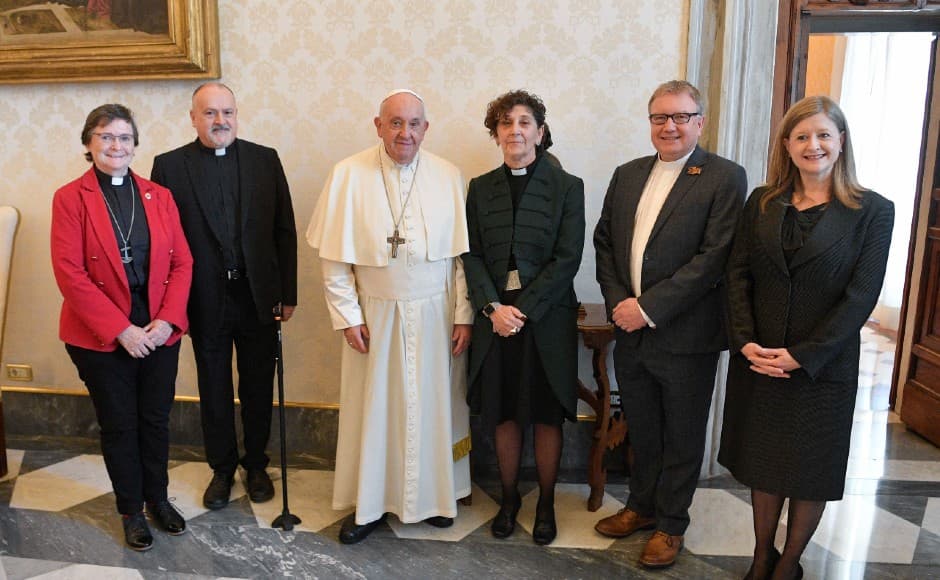LEICESTER, United Kingdom – Pope Francis praised the growing relations between Catholics and Protestants in Scotland during a meeting with leaders of the Church of Scotland last week.
“We talked how we both recognized ourselves in what is happening to the ordinary people there, and how we need to recognize our common humanity more openly,” said Rt. Rev. Sally Foster-Fulton, the Moderator of the General Assembly of the Church of Scotland, on Nov. 4.
“We talked about how important it is that Christians speak and act together in unity in the world today,” she added.
The Church of Scotland is the national church in Scotland and is a Calvinist Presbyterian denomination.
After centuries of bad blood stemming from the Reformation, last year the Church of Scotland and the Catholic Church in Scotland agreed to the “St. Margaret’s Declaration,” committing them to friendship and cooperation.
The document says the two religions “recognize the hurt and the harm that our forebears did to each other in times past, and we repent and ask forgiveness of one other. We also recognize that, even in more recent times, much could have been said between us more kindly, written more magnanimously, and done more charitably, to promote pardon and healing and friendship among Christians in our land.”
It has been named the Saint Margaret Declaration after the 11th century Scottish queen venerated for her missionary Christian faith and generosity to poor people.
“We talked about the intention of that, and the energy behind ecumenical and interfaith work in Scotland,” Foster-Fulton said.
“We talked about how important it was for us, as leaders in the Church, to be counter cultural and challenge some of the status quo around ideas about who comes first in the queue, particularly our Gospel bias to the poor,” she continued. “We agreed on the importance of maintaining that prayerful and prophetic voice for peace in our world today and making sure that is something we do not waver from.”
During the Vatican meeting, the pope was given a print of “Throwaway People” by Michael McVeigh.
McVeigh is regarded as a modern-day folk artist whose work depicts everyday life in Scotland, and ‘Throwaway People’ is an expression of the plight of those on the margins of society. The artist was born in Dundee, where he studied Drawing and Painting at Duncan of Jordanstone College of Art from 1977 – 1982.
Foster-Fulton said the work is an “expression of the fragility of life and how easy it is to fall through the cracks.”
“It is a print that I have remembered forever, and I said to Pope Francis, who has dedicated his life to try and make sure that does not happen, that I wanted him to have that picture. He took it and turned it over and wrote something on the back in Italian so he would remember and was very, very taken by it,” she said.
She added the pope asked her “to give one of his gifts to Michael McVeigh and say thank you from him and I think that is pretty cool.”
Foster-Fulton also said she and Francis discussed the escalation of violence across Israel and Palestine and the war in Ukraine.
After meeting with the pope, Foster-Fulton and her group visited Rome’s Pontifical Scots College, which has educated Catholic priests since 1616.
The seminary gave the group a presentation on the Catholic Church’s vision for seminary formation and the particular way that this is put into practice in the college. The seminary said the questions from the visitors showed their keen interest in formation and they shared their own experience of formation for candidates for ministry in the Church of Scotland.
On Monday, Foster-Fulton was scheduled to have discussions with members of the Waldensian Evangelical Church, and to participate in a seminar at the Waldensian Faculty of Theology before having dinner with the British ambassador to the Holy See, Chris Trott.
On Tuesday, the Moderator will visit the Churches Commission for Migrants in Europe which is having its annual meeting in Rome.















